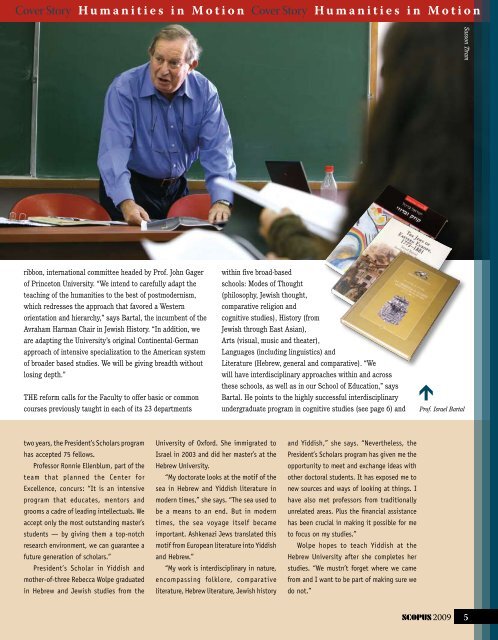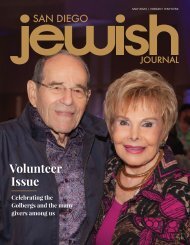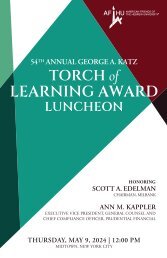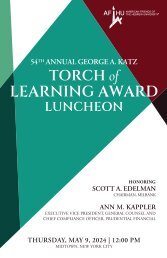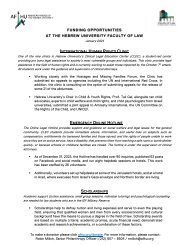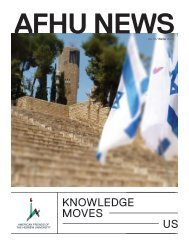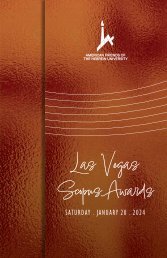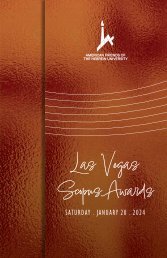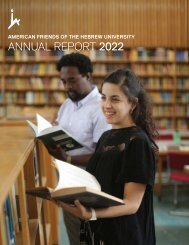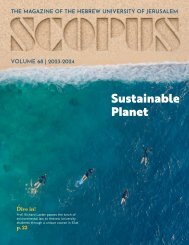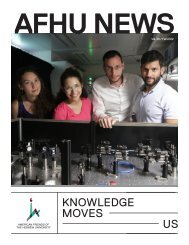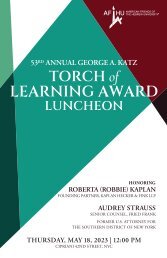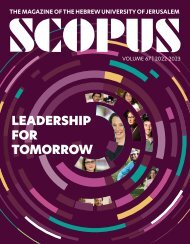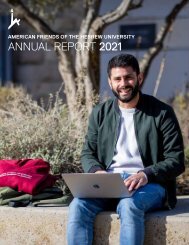Create successful ePaper yourself
Turn your PDF publications into a flip-book with our unique Google optimized e-Paper software.
Cover Story<br />
Humanities in Motion<br />
Cover Story<br />
Humanities in Motion<br />
Sasson Tiram<br />
ribbon, international committee headed by Prof. John Gager<br />
of Princeton University. “We intend to carefully adapt the<br />
teaching of the humanities to the best of postmodernism,<br />
which redresses the approach that favored a Western<br />
orientation and hierarchy,” says Bartal, the incumbent of the<br />
Avraham Harman Chair in Jewish History. “In addition, we<br />
are adapting the University’s original Continental-German<br />
approach of intensive specialization to the American system<br />
of broader based studies. We will be giving breadth without<br />
losing depth.”<br />
THE reform calls for the Faculty to offer basic or common<br />
courses previously taught in each of its 23 departments<br />
within five broad-based<br />
schools: Modes of Thought<br />
(philosophy, Jewish thought,<br />
comparative religion and<br />
cognitive studies), History (from<br />
Jewish through East Asian),<br />
Arts (visual, music and theater),<br />
Languages (including linguistics) and<br />
Literature (Hebrew, general and comparative). “We<br />
will have interdisciplinary approaches within and across<br />
these schools, as well as in our School of Education,” says<br />
Bartal. He points to the highly successful interdisciplinary<br />
undergraduate program in cognitive studies (see page 6) and<br />
Prof. Israel Bartal<br />
two years, the President’s Scholars program<br />
has accepted 75 fellows.<br />
Professor Ronnie Ellenblum, part of the<br />
team that planned the Center for<br />
Excellence, concurs: “It is an intensive<br />
program that educates, mentors and<br />
grooms a cadre of leading intellectuals. We<br />
accept only the most outstanding master’s<br />
students — by giving them a top-notch<br />
research environment, we can guarantee a<br />
future generation of scholars.”<br />
President’s Scholar in Yiddish and<br />
mother-of-three Rebecca Wolpe graduated<br />
in Hebrew and Jewish studies from the<br />
University of Oxford. She immigrated to<br />
Israel in 2003 and did her master’s at the<br />
Hebrew University.<br />
“My doctorate looks at the motif of the<br />
sea in Hebrew and Yiddish literature in<br />
modern times,” she says. “The sea used to<br />
be a means to an end. But in modern<br />
times, the sea voyage itself became<br />
important. Ashkenazi Jews translated this<br />
motif from European literature into Yiddish<br />
and Hebrew.”<br />
“My work is interdisciplinary in nature,<br />
encompassing folklore, comparative<br />
literature, Hebrew literature, Jewish history<br />
and Yiddish,” she says. “Nevertheless, the<br />
President’s Scholars program has given me the<br />
opportunity to meet and exchange ideas with<br />
other doctoral students. It has exposed me to<br />
new sources and ways of looking at things. I<br />
have also met professors from traditionally<br />
unrelated areas. Plus the financial assistance<br />
has been crucial in making it possible for me<br />
to focus on my studies.”<br />
Wolpe hopes to teach Yiddish at the<br />
Hebrew University after she completes her<br />
studies. “We mustn’t forget where we came<br />
from and I want to be part of making sure we<br />
do not.”<br />
<strong>2009</strong> 5


